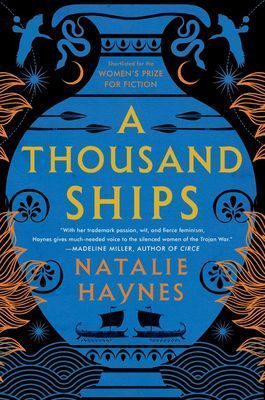
A Thousand Ships A Novel
"With her trademark passion, wit, and fierce feminism, Natalie Haynes gives much-needed voice to the silenced women of the Trojan War."--Madeline Miller, author of Circe Shortlisted for the Women's Prize for Fiction, a gorgeous retelling of the Trojan War from the perspectives of the many women involved in its causes and consequences--for fans of Madeline Miller. This is the women's war, just as much as it is the men's. They have waited long enough for their turn . . . This was never the story of one woman, or two. It was the story of them all . . . In the middle of the night, a woman wakes to find her beloved city engulfed in flames. Ten seemingly endless years of conflict between the Greeks and the Trojans are over. Troy has fallen. From the Trojan women whose fates now lie in the hands of the Greeks, to the Amazon princess who fought Achilles on their behalf, to Penelope awaiting the return of Odysseus, to the three goddesses whose feud started it all, these are the stories of the women whose lives, loves, and rivalries were forever altered by this long and tragic war. A woman's epic, powerfully imbued with new life, A Thousand Ships puts the women, girls and goddesses at the center of the Western world's great tale ever told. --Madeline Miller, author of Circe
Reviews
Denisse Garcia Ramírez @den_gr
jus@stilesrick
Chris Dailey@cris_dali
Andrea Morales@matchandrea
Laura Dobie@MovingToyshop
lala@polijus
Caroline Boone@carlyboone
Teresa Bonifácio@teresabonifacio
Katelyn Caillouet@hellokatelyn
Julie Rubens@julierubens
Marcy Pursell @mpursell21
Jordan@jrstos
rita@nomnomriir
Apiecalypse Jen@chippedfang
Amira BEN@amirasreading
Lara Engle@bzzlarabzz
Holly@tolya
Kaitlyn Johnson @kaitlyn_rose_feyre_lou
Cindy Lieberman@chicindy
Anna@anbrs
Elle Geoghegan @ditsydreamer
Cheri McElroy@cherimac
tal@bookish_sunshine
illya@ophillya
Highlights
Samantha Murguia@smurguia96
Samantha Murguia@smurguia96
Samantha Murguia@smurguia96
Samantha Murguia@smurguia96
Jordan@jrstos
Jordan@jrstos
Jordan@jrstos
Apiecalypse Jen@chippedfang
Amira BEN@amirasreading
Amira BEN@amirasreading
Amira BEN@amirasreading
Amira BEN@amirasreading
Amira BEN@amirasreading
Amira BEN@amirasreading
Amira BEN@amirasreading
Amira BEN@amirasreading
Amira BEN@amirasreading
Amira BEN@amirasreading
Amira BEN@amirasreading
Amira BEN@amirasreading
Amira BEN@amirasreading
Amira BEN@amirasreading
sharkie@scyllalycoris
Page 45